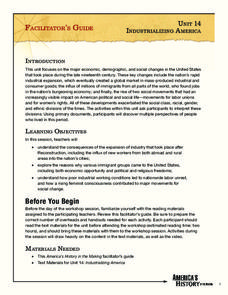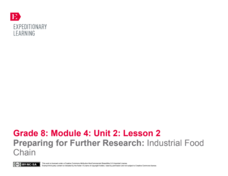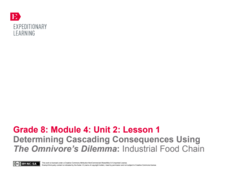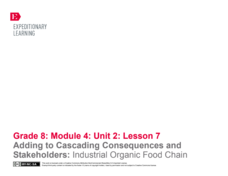Curated OER
The Impact of Cultural Values in EArly Industrial England
Tenth graders analyze works from the period of the Industrial Revolution in England and identify the cultural values depicted and inferred that paved the way for the Industrial Revolution to occur at this time. They create captions that...
Digital Public Library of America
The American Whaling Industry
When thinking about the American whaling industry most imagine Moby Dick and Nantucket sleigh rides, harpoons and scrimshaw, whale-oil lamps and baleen in women's corsets. But it may come as a surprise that the industry was also...
Core Knowledge Foundation
Isn’t It Exciting? (The American Industrial Revolution and Urbanization)
America was built on the ingenuity, work ethic, and foresight of our ancestors. Sixth graders learn about the complex Gilded Age in American history, including the prominent inventors and captains of industry, and how they all connect...
Alabama Department of Archives and History
Working in Birmingham's Iron Industry
What did railroads, iron, and industry contributed to Birmingham's successful growth? The lesson explains how the iron industry worked. It also describes how the location of Birmingham and its proximity to railroads. played a key role in...
Library of Congress
Industrial Revolution
Could you live without your phone? What about cars, steel, or clothing? Class groups collaborate to produce presentations that argue that either the telephone, the gramophone, the automobile, the textile industry, or the steel industry...
Curated OER
The Industrial Age in America: Sweatshops, Steel Mills, and Factories
Students investigate the working conditions during the Age of Industrialization. They research how workers reacted to the conditions and discuss the results of labor movement.
Annenberg Foundation
Industrializing America
Imagine an eight year old spindle boy working barefoot in a factory in the late 1800s. Scholars research the industrial period in American history in the 14th lesson of a 22-part series that explores the country's background. Groups...
EngageNY
Adding to Cascading Consequences and Stakeholders: Industrial Food Chain
Young researchers create a class Cascading Consequences chart to see how the industrial food chain affects people, animals, and the environment. They also work in teams to complete a Stakeholders chart for the industrial food chain model...
EngageNY
Preparing for Further Research: Industrial Food Chain
Using an informative resource, pupils discover how to write research questions that are focused, answerable, and relevant. Scholars evaluate resources about the industrial food chain from Michael Pollan's The Omnivore's Dilemma and then...
Curated OER
Fisheries in the Open Ocean
Students explore fisheries in the open ocean. In this ocean environment instructional activity, students study the impact fisheries have on the ocean habitat. Students complete a WebQuest and summary project regarding fisheries.
Curated OER
Industrialization In Lowell, Massachusetts
Young scholars explore the idealistic expectations of the industrialists who financed and built mills in Lowell, Massachusetts. They research how the expectations of Lowell mill founders compared to the reality of life in the textile...
Science 4 Inquiry
Carbon and Climate
The carbon cycle is natural and has happened for millions of years, so can humans change it? Young scientists play the role of carbon as they travel through the carbon cycle. They complete two rounds, once before the industrial...
Curated OER
Mucket Mania: The Mussel Industry in Arkansas
Middle and high schoolers read and discuss articles about the mussel industry in Arkansas. They pay close attention to the history of pearling and button making industries on the Black and White Rivers of Arkansas. This impressive,...
Curated OER
The DIY: A Hands-On Look at the New Industrial Revolution
Upper graders explore the new industrial revolution and how the tech boom in recent years is similar and different to the Industrial Revolution of the past. They watch a video, explore web sites, and discuss what they see. They work...
Skyscraper Museum
Building a Skyscraper
The construction of skyscrapers is no simple undertaking, involving the careful coordination and planning of many different people. The third lesson in this series explores this detailed process by first teaching children about the main...
Curated OER
The Industrial Revolution and Women
Students learn about inventions of the Industrial Revolution and their impact on life. In this Industrial Revolution lesson, students look at how the Industrial Revolution changed the work experience from farms to factories. They tell...
Curated OER
The Industrial Age in America: Robber Barons and Captains of Industry
Students define terms "robber baron" and "captain of industry," list positive and negative actions of one or more captains of industry/robber barons, and take and support stand as to whether particular financier/industrialist is or is...
Alabama Department of Archives and History
Alabama's New South Era
The industrialization and urbanization of Alabama during the New South era (1865-1914) is the focus of a lesson that asks class members to use primary source documents to examine the impact of industrialization on Alabama workers and...
EngageNY
Determining Cascading Consequences Using The Omnivore’s Dilemma: Industrial Organic Food Chain
Organic versus conventional farming: which option is best? Pupils use Michael Pollan's The Omnivore's Dilemma to determine the cascading consequences of the industrial organic food chain. They work in research teams to create an...
EngageNY
Determining Cascading Consequences Using The Omnivore’s Dilemma: Industrial Food Chain
Which of Michael Pollan's four food chains from his book The Omnivore's Dilemma would best feed everyone in the United States? Using a thought-provoking resource, scholars learn how to create a Cascading Consequences chart to answer the...
EngageNY
Using Search Terms for Further Research: Industrial Organic Food Chain
Class members conduct independent research to continue examining the consequences of the industrial organic food chain from Michael Pollan's The Omnivore's Dilemma. Pupils learn about source credibility and effective search terms, then...
EngageNY
Adding to Cascading Consequences and Stakeholders: Industrial Organic Food Chain
Researchers continue determining the effects of the industrial organic food chain that Michael Pollan describes in The Omnivore's Dilemma. In teams, pupils add to their Cascading Consequences charts and complete Stakeholders charts based...
EngageNY
Reading for Gist and Answering Text-Dependent Questions: Industrial Food Chain
Where do humans fall on the food chain? Scholars read about the Industrial Food Chain in The Omnivore’s Dilemma sections. They use word catchers to record unfamiliar words as they read and place sticky notes in the margins to annotate...
EngageNY
Forming a Research-Based Claim: Stakeholder Chart on Better Industrial Water Management
It's time to stake a claim! Working with partners, scholars create stakeholder charts for better industrial management of water. As they complete the chart, pupils consider an option for managing water more sustainably, identify...
Other popular searches
- Fisheries
- Radio Industry
- "Technology" Industry
- Auto Industry
- Music Industry
- Cattle Industry
- Automotive Industry
- Automobile Industry
- Film Industry
- Fishing Industry
- Aviation Industry
- Forest Industry

























